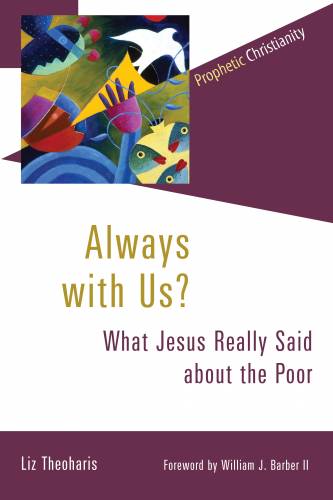Anderson and Edmiston to speak on the intersection of race and poverty
by Gregg Brekke | Presbyterian News Service

Denise Anderson (left) and Jan Edmiston, Co-Moderators of the 222nd General Assembly of the Presbyterian Church (U.S.A.). (Photo by Danny Bolin)
LOUISVILLE – The Rev. Denise Anderson and the Rev. Jan Edmiston, Co-Moderators of the 222nd Presbyterian Church (U.S.A.) General Assembly, will present a plenary session tentatively titled “At the Cross: Intersections the Church Must Navigate” during this year’s Big Tent. Their talk will be held from 4 to 5:15 p.m. Friday at the gathering of the PC(USA) on the campus of Washington University in St. Louis on July 6–8.
To guide the church into this discussion, the Co-Moderators will introduce a study on the book Always With Us?: What Jesus Really Said about the Poor by Liz Theoharis. Hoping the book will be a “great segue” for those who engaged in their recommended study of Waking Up White, Anderson says, “The focus of our plenary will be the intersectional issues of race and poverty.”
“We invited our congregations — through the study of Waking Up White — to enter the conversation or continue in the fray about race,” says Anderson. “So now we are focusing on poverty, and what we want to do is marry these two concepts and talk about the various intersections that occur.
“Why is it important to talk about race? Because race has an impact on our work to alleviate poverty. And our work to alleviate poverty has an impact on what our environmental witness is.”
 The Co-Moderators agree that the introduction of Always With Us? is not the end of the conversation they have encouraged on race, but rather a way to expand it.
The Co-Moderators agree that the introduction of Always With Us? is not the end of the conversation they have encouraged on race, but rather a way to expand it.
“We’re not looking to switch gears so much as to add this into the conversation,” says Anderson. “We want to make clear in this plenary, please continue with the conversations on race. Please continue to engage with Waking Up White.
“Whenever we travel, people tell us about their experience with this book study. Some are very encouraging and some are really difficult. But most people tell us they’re looking for a way forward with what they’ve wrestled. So we’re offering this discussion on intersections, and more specifically Liz’s work on poverty, as a way forward to act on what you now know about race.”
Saying her reading of the book and powerful stories about people living in poverty has influenced her desire to engage the church, Edmiston believes the new study will complement the Hands and Feet initiative launched by the Rev. Dr. J. Herbert Nelson, II, PC(USA) Stated Clerk.
“This effort dovetails really well into what J. Herbert [Nelson] is trying to do with the Hands and Feet initiative,” says Edmiston. “The intersection is what’s really important. It can’t be just one little slice of something — it has to be the whole pie.
“It feels overwhelming when we’re looking at all the different systems. Starting with race and continuing with race is really important, but all these things do intersect and overlap.”
The timing of the initiative, study and continued conversations on race, not to mention St. Louis as the location, is not lost on the Co-Moderators.
“We’re coming up on the 50th anniversary of Martin Luther King introducing the Poor People’s Campaign, the campaign he was working on at the time of his assassination,” says Anderson. “There has been a grassroots, ecumenical and interfaith push to reignite the Poor People’s Campaign ahead of what is being called the jubilee anniversary of it. We think that has everything to do with what we’re trying to accomplish in the PC(USA) in terms of its engagement with race. You cannot talk about race without talking about poverty.”
Aside from encouraging Presbyterians to attend Big Tent as an “opportunity to connect in an off-General Assembly year,” Edmiston and Anderson are optimistic that their discussion will further inspire attendees to address issues of poverty and race in their communities.
“My hope is they will be able to transfer what we talk about into their specific context,” says Edmiston. “That they don’t just leave the meeting smarter, but they leave wanting to make an impact in their own congregations or mid councils, or wherever they are serving.”
Anderson agrees, saying, “Perhaps they will have a clearer idea how to do that. We don’t presume we’ll be able to answer every question that everyone has about how to engage in issues of justice, but ‘here’s a great place to start’ is what we hope the plenary will offer.”
—–
Big Tent registration information and program details are available at this link.
For text updates on this year’s event, text BIGTENT to 41411.
![]() You may freely reuse and distribute this article in its entirety for non-commercial purposes in any medium. Please include author attribution, photography credits, and a link to the original article. This work is licensed under a Creative Commons Attribution-NonCommercial-NoDeratives 4.0 International License.
You may freely reuse and distribute this article in its entirety for non-commercial purposes in any medium. Please include author attribution, photography credits, and a link to the original article. This work is licensed under a Creative Commons Attribution-NonCommercial-NoDeratives 4.0 International License.
Categories: Presbyterian News Service
Tags: big tent, big tent 2017, co-moderators, denise anderson, faith, gathering, Jan Edmiston, pcusa, poverty, presbyterian, race, racism, st. louis